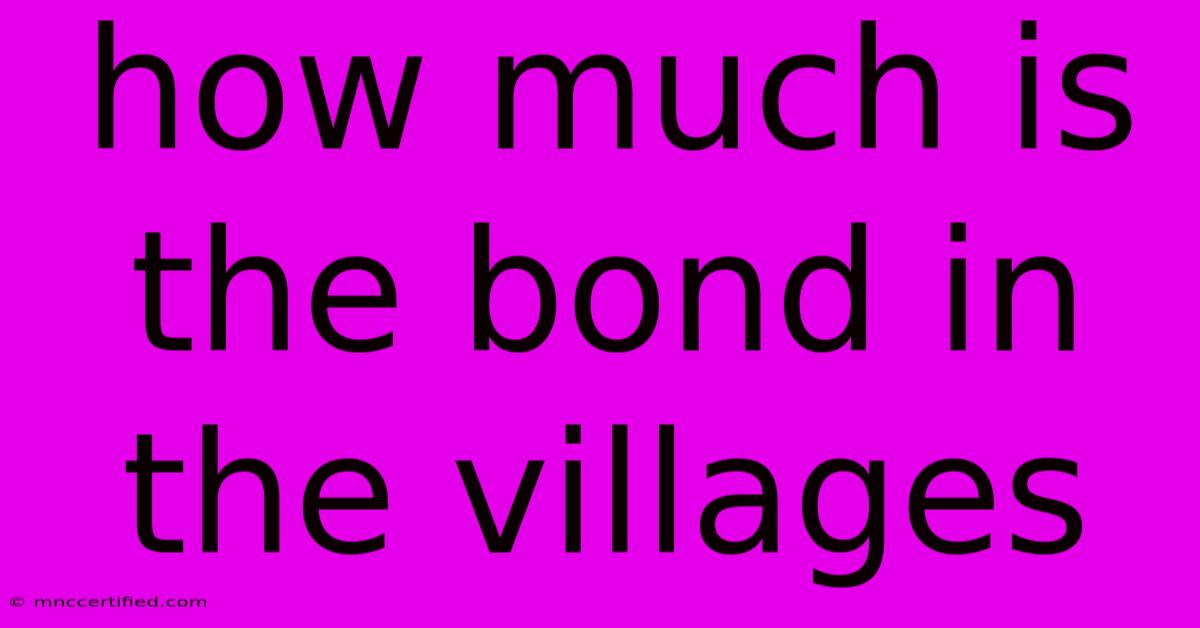How Much Is The Bond In The Villages

Table of Contents
How Much is the Bond in the Villages? A Guide to Understanding Housing Costs
The cost of living in the villages is often associated with a lower price tag compared to urban areas, but that doesn't necessarily mean it's cheap. One significant expense to consider, especially when buying a home, is the bond.
This article will explore the bond cost in the villages, examining factors that influence its value, breaking down the calculation process, and providing tips for navigating this crucial step in your village homeownership journey.
What is a Bond?
A bond is a loan you take from a financial institution to finance the purchase of a property. It's essentially a mortgage that you repay over an agreed-upon period with interest.
Factors Affecting Bond Cost in the Villages
Several variables determine the bond amount you'll pay in the villages:
1. Property Value: The most significant factor is the purchase price of the property. The higher the price, the larger the bond amount.
2. Interest Rates: Current interest rates set by the Reserve Bank and individual financial institutions directly influence the cost of your bond. Higher interest rates mean higher monthly repayments.
3. Loan Term: The loan term (the duration of the bond) also impacts the monthly payments. A longer loan term results in lower monthly payments, but you'll pay more interest overall.
4. Deposit: A deposit is an upfront payment you make towards the purchase price. A larger deposit reduces the amount you need to borrow, leading to a smaller bond and lower monthly payments.
5. Property Type: The type of property (e.g., house, apartment, land) also influences the bond cost. Factors such as location, size, and amenities all play a role.
6. Creditworthiness: Your credit score and history are crucial for determining the interest rate you'll receive. A good credit score usually translates into lower interest rates.
How to Calculate the Bond Cost
While the exact bond amount will be determined by your chosen financial institution, you can use a bond calculator online to get an estimate. These calculators take into account factors such as:
- Purchase price
- Interest rate
- Loan term
- Deposit
Example:
Let's say you're buying a house in the villages for R1,000,000. You have a deposit of R200,000 and are considering a 20-year loan with an interest rate of 10%. Using an online bond calculator, you'll find that your estimated monthly repayment would be around R9,657.
Important Note: This is just an estimate. The actual amount may vary depending on individual factors and the specific financial institution you choose.
Tips for Managing Bond Costs
Here are some strategies to minimize your bond costs:
- Shop around for the best interest rates: Compare offers from different financial institutions to secure the most favorable terms.
- Increase your deposit: A larger deposit reduces the loan amount, leading to lower monthly payments.
- Consider a shorter loan term: While this means higher monthly payments, you'll pay less interest overall.
- Improve your credit score: A good credit score can qualify you for lower interest rates.
- Negotiate with the seller: Try to negotiate a lower purchase price to reduce the bond amount.
Conclusion
The cost of a bond in the villages can vary significantly depending on various factors. By understanding these influences and using tools like bond calculators, you can estimate your potential bond costs and make informed decisions about your homeownership journey. Remember to explore different financial institutions, compare offers, and consider strategies to manage your bond costs effectively.

Thank you for visiting our website wich cover about How Much Is The Bond In The Villages. We hope the information provided has been useful to you. Feel free to contact us if you have any questions or need further assistance. See you next time and dont miss to bookmark.
Featured Posts
-
Tech Not Around In 1996 Cowboys Edition
Nov 11, 2024
-
Crypto Tax Professionals Slack Group
Nov 11, 2024
-
Where I Have Traveled Display Tokens
Nov 11, 2024
-
Real Estate Agent Vs Insurance Agent
Nov 11, 2024
-
Hamster Com Video Converter Ultimate
Nov 11, 2024